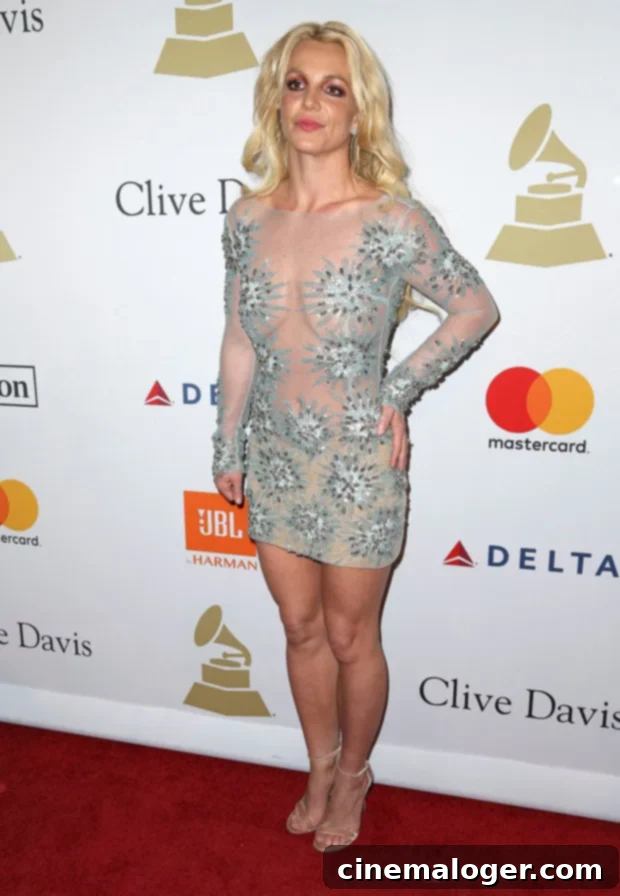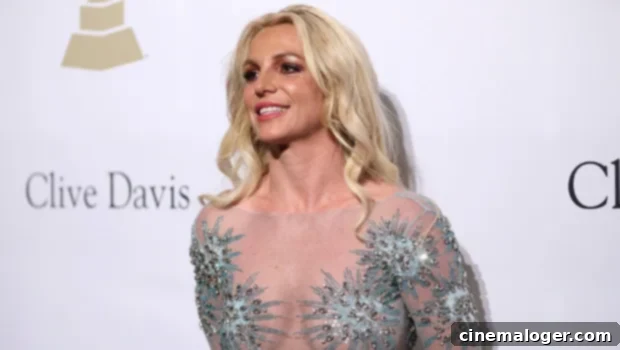Britney Spears Asserts Control Over Her Instagram Amidst Conservatorship Battle and Documentary Fallout
Pop icon Britney Spears, a figure whose life has been under intense public scrutiny for decades, recently took a definitive step to clarify her autonomy over her digital presence. After a wave of speculation and concern from her global fanbase regarding who truly managed her social media accounts, particularly Instagram, the 39-year-old superstar confirmed that she is unequivocally the author behind her own posts. In a statement shared with TMZ, Britney declared, “I write my posts,” directly addressing swirling rumors and reasserting her personal agency in the digital realm. This crucial confirmation arrived amidst heightened public interest in her life and conservatorship, largely fueled by the impactful *New York Times* documentary, Framing Britney Spears, which brought the complexities of her situation to the forefront of mainstream discussion.
The speculation surrounding Britney’s social media began to escalate following the release of the documentary, which meticulously detailed her rise to stardom, the media’s often exploitative treatment of her, and the controversial conservatorship that has governed her life for over a decade. A significant catalyst for these doubts was an allegation made by her former makeup artist, Billy Brasfield. Brasfield publicly claimed that Britney had personally informed him she was not the one responsible for authoring her highly emotional Instagram post from March 30, in which she ostensibly shared her reaction to the documentary. This claim, published by outlets like Page Six, quickly fueled fan theories that Britney’s posts might be curated or even controlled by external parties, rather than reflecting her genuine thoughts and feelings. The veracity of her online presence became a central point of discussion among supporters of the #FreeBritney movement, who advocate for her liberation from the conservatorship.
However, Britney Spears herself has now directly refuted Brasfield’s account, aiming to dispel any lingering doubts about her control. Speaking to TMZ, she unequivocally stated, “I’m not talking to [Billy] at all…I’m not sure who he is talking to, but I am not talking to Billy B.” This firm denial served to invalidate the former makeup artist’s claims and underscored Britney’s determination to set the record straight regarding her direct involvement in her social media communications. The incident highlighted the intense scrutiny and conflicting narratives that often surround her public image, making her personal confirmation all the more significant for fans eager to hear directly from the pop star.
The Instagram post at the heart of this particular controversy, published on March 30, featured Britney dancing in her home, accompanied by a lengthy caption. In this post, the “Circus” singer articulated deeply personal sentiments, explaining that she felt “embarrassed” by the portrayal of her life in the *Framing Britney Spears* documentary. She shared with her millions of followers that she “cried for two weeks” after seeing parts of the film, and continued to feel emotional about it. This raw and vulnerable message resonated with many, but Brasfield’s subsequent claims had cast a shadow of doubt over its authenticity. Britney’s recent clarification, therefore, serves to validate the emotions expressed in that specific post, confirming it as her own genuine reaction to the documentary and the narrative it presented about her life.
View this post on Instagram
A post shared by Britney Spears (@britneyspears)
The profound ripple effects of the *Framing Britney Spears* documentary extended far beyond mere public discussion; it dramatically propelled Britney’s nearly 13-year conservatorship back into the glaring spotlight. This legal arrangement, which has granted extensive control over her personal and financial affairs to others, primarily her father Jamie Spears, became the subject of renewed legal scrutiny and public outcry. The documentary meticulously chronicled the origins of the conservatorship, established in 2008 following Britney’s highly publicized personal struggles, and questioned its continued necessity given her demonstrated ability to perform, record music, and live a seemingly stable life for many years. It critically examined the mechanisms of control within the conservatorship, leading to significant legal developments, including Britney’s ongoing efforts to have Jodi Montgomery permanently appointed as her conservator, replacing her father in that role.
Beyond the legal intricacies, the documentary also cast a harsh, revealing light on the relentless and often cruel media scrutiny that Britney, a global superstar since her teenage years and a young mother during critical junctures of her career, endured at the hands of the press. It showcased how tabloids, paparazzi, and even mainstream news outlets contributed to a toxic environment that severely impacted her mental health and public image. This historical context is vital to understanding the depth of public support for Britney and the significance of her attempts to reclaim her narrative. Her fans, having witnessed her journey through the documentary, became even more invested in her fight for autonomy, making every statement she makes, especially on social media, a focal point of hope and concern.
Just prior to the controversy ignited by Billy Brasfield, Britney had appeared to communicate her deepest feelings about the investigative documentary directly to her fanbase through her Instagram account. The caption to her March 30 post, accompanying a video of her dancing freely in her home, conveyed a powerful message about her life in the public eye. “My life has always been very speculated …watched … and judged really my whole life,” the caption began, reflecting a sentiment many public figures can relate to, but amplified by her unique circumstances. She continued, highlighting the perpetual exposure she has faced: “I have been exposed my whole life performing in front of people.” This direct communication from Britney herself, expressing vulnerability and frustration, was incredibly impactful for her followers, offering a rare glimpse into her emotional state following the documentary’s release.
Elaborating further on her enduring struggle with public perception, Britney’s caption continued: “It takes a lot of strength to TRUST the universe with your real vulnerability cause I’ve always been so judged… insulted… and embarrassed by the media… and I still am till this day,” she wrote, punctuating her sentiments with a series of thumbs down emojis to emphasize her disapproval of how she has been treated. This raw honesty underscored the psychological toll of constant media scrutiny and public judgment. Her statement wasn’t just a reaction to the documentary; it was a broader commentary on her experience as a global icon, whose every move has been dissected and often misrepresented. The ability for her to express such profound vulnerability directly to her audience, without intermediaries, is precisely why the question of who controls her social media became so paramount.
In the same heartfelt post, Britney also touched upon themes of resilience and self-care amidst her ongoing challenges. “As the world keeps on turning and life goes on we still remain so fragile and sensitive as people !!!” she shared, acknowledging the universal human condition while subtly referencing her own battles. She then directly addressed the documentary: “I didn’t watch the documentary but from what I did see of it I was embarrassed by the light they put me in … I cried for two weeks and well …. I still cry sometimes.” This candid admission about her emotional response to the documentary deeply resonated with fans, who interpreted it as a genuine cry for understanding and empathy. Her subsequent confirmation that she controls her posts adds significant weight to these statements, solidifying them as her authentic voice and feelings.
Despite the emotional pain, Britney also conveyed a message of hope and personal coping mechanisms. “I do what I can in my own spirituality with myself to try and keep my own joy … love … and happiness. Every day dancing brings me joy !!! I’m not here to be perfect … perfect is boring … I’m here to pass on kindness.” This closing sentiment provided a powerful insight into her personal philosophy and her efforts to maintain mental well-being despite her extraordinary circumstances. Her emphasis on dancing as a source of joy has been a consistent theme in many of her Instagram videos, offering fans a window into her personal moments of freedom and self-expression. This narrative of finding joy amidst adversity further cements her image as a resilient pop icon.

The clarity offered by Britney regarding her social media control marks a pivotal moment in her ongoing public narrative. In an era where celebrity interactions with fans are increasingly mediated by digital platforms, the authenticity of an artist’s voice online is paramount. For someone under a conservatorship, the ability to control one’s personal message is not merely about public relations; it’s about fundamental autonomy and self-determination. This confirmation from Britney herself provides crucial reassurance to her millions of followers and to the #FreeBritney movement that her Instagram posts are indeed direct reflections of her thoughts and experiences, circumventing any potential for external manipulation or censorship.
Her statement strengthens the argument for her capacity to manage her own life decisions, a central tenet of the calls for the termination of her conservatorship. If Britney is capable of crafting and publishing nuanced, emotionally resonant messages to her vast audience, it lends considerable weight to the view that she possesses the mental acuity and personal agency required to make independent choices concerning her finances, career, and personal well-being. This direct engagement challenges the very premise of a conservatorship that restricts such freedoms, especially as she continues to publicly navigate the legal battles surrounding her future.
Moreover, Britney’s decision to directly address the allegations about her social media control exemplifies a growing trend among public figures to take ownership of their digital presence. In a world awash with misinformation and speculative narratives, celebrities are increasingly using their personal platforms to communicate unfiltered messages, bypass traditional media gatekeepers, and connect authentically with their supporters. For Britney, this act is particularly potent, transforming her Instagram feed from a potential battleground of conflicting theories into a verified conduit for her own voice. It underscores her resilience and her persistent effort to reclaim her personal story, one post at a time, echoing her message of passing on kindness and finding joy even in the face of immense challenges.
As the legal proceedings concerning her conservatorship continue to unfold, Britney Spears’ assertion of control over her social media stands as a significant declaration of independence. It not only clarifies the authorship of her deeply personal posts but also reinforces her desire for autonomy and her enduring connection with a fanbase that has tirelessly championed her cause. Her voice, now confirmed as her own on Instagram, remains a powerful instrument in her ongoing journey towards greater personal freedom and self-determination.
